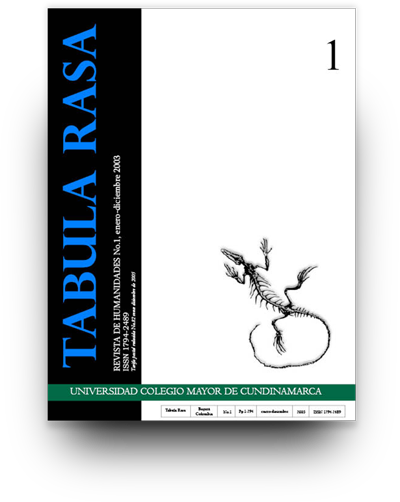«Worlds and Wisdoms Otherwise». The Latin American Modernity/Coloniality Research Program
«Mundos y conocimientos de otro modo». El programa de investigación de modernidad/colonialidad latinoamericano
Show authors biography
This article presents and examines critically the work of a group of researchers in LatinAmerica and the United States that are crafting a novel reinterpretation of modernity, globalityand difference. I label this group as «the modernity/coloniality research program», to refer towhat seems to be an emergent but already significantly cohesive perspective that is fuelling aseries of researches, meetings, publications, and so forth around a shared –even if coursecontested—set of concepts. This body of work constitutes a novel perspective from LatinAmerica but not only for Latin America but for the world of the social and human sciences as a whole. By this I do not mean that the work of this group is just of interestto allegedlyuniversal social and human sciences, but that that the group seeks to make a decisiveintervention into the very discursivity of the modern sciences in order to craft another spacefor the production of knowledge –an «other way of thinking», «un paradigma otro»,the verypossibility of talking about «worlds and knowledges otherwise». What this group suggestsis that an other thought, an «other knowledge» –and another world, in the spirit of PortoAlegre’s World Social Forum—, are indeed possible.
Article visits 823 | PDF visits 272
Downloads
- Alcoff, Linda. 1991. «The Problem of Speaking for Others». En Critical Inquiry. 20: 5-32.
- «Cultural Feminism versus Poststructuralism: The Identity Crisis in Feminist Theory». En Signs. 13: 405-36.
- Alcoff, Linda y Eduardo Mendieta (eds.). 2000. Thinking from the Underside of History. Enrique Dussel’s Philosophy of Liberation. Rowman and Littelfield. Lanham.
- Anzaldúa, Gloria y Analouise Keating (eds.). 2003. This Bridge We Call Home. Radical Visions for Social Transformation. Routledge. New York.
- Anzaldúa, Gloria. 2003. «Preface. (Un)natural bridges, (Un)safe spaces». En G. Anzaldúa y A. Keating (eds). This Bridge We Call Home. Radical Visions for Social Transformation.
- Pp. 1-5. Routledge. New York.
- Appadurai, Arjun. 1996. Modernity at Large. University of Minnesota Press. Minneapolis.
- Arce, Alberto y Norman Long. 2000. Anthropology, Development, and Modernities. Routledge. London.
- Behar, Ruth y Deborah Gordon (eds.). 1995. Women Writing Culture. University of California Press. Berkeley.
- Belausteguigoitia, Marisa. 2002. «The Color of the Earth: Indigenous Women ‘Before the Law’». En Development. 45(1): 47-53.
- «Visualizing Places: ‘She Looks, therefore… Who Is?’». En Development. 41(2): 44-52.
- Beverly, John y José Oviedo (eds.). 1993. The Postmodernism Debate in Latin America. Duke University Press. Durham.
- Bhavani, Kum-Kum, John Foran y Priya Kurian (eds.). 2003. Feminist Futures: Re-Imagining Women, Culture and Development. Zed Books. London.
- Boff, Leonardo. 2002. El cuidado esencial. Editorial Trotta. Madrid.
- Castro-Gómez, Santiago. 1996. Crítica de la razón latinoamericana. Puvill Libros. Barcelona.
- Castro-Gómez, Santiago (ed.). 2002. La reestructuración de las ciencias sociales en América Latina.
- Universidad Javeriana. Bogotá.
- Castro-Gómez, Santiago y Eduardo Mendieta (eds.). 1998. Teorías sin disciplina, latinoamericanismo, poscolonialidad y globalización en debate. Miguel Ángel Porrúa/ University of San Francisco. México, D.F.
- Coronil, Fernando. 1997. The Magical State: Nature, Money and Modernity in Venezuela. University of Chicago Press. Chicago.
- Coronil, Fernando. 1996. «Beyond Occidentalism: Toward Nonimperial Geohistorical Categories». En Cultural Anthropology. 11(1): 52-87.
- Dussel, Enrique. 2000. «Europe, Modernity, and Eurocentrism». En Nepantla. 1(3): 465- 478.
- The Underside of Modernity. Humanities Press. Atlantic Highlands, NJ.
- «Eurocentrism and Modernity». En J. Beverly y J. Oviedo (eds.). The Postmodernism Debate in Latin America. Pp. 65-76. Duke University Press. Durham.
- 1492. El encubrimiento del Otro. Antropos. Bogotá.
- [1975]. Introducción a la Filosofía de la Liberación. Editorial Nueva América. Bogotá.
- Filosofía de la Liberación. Editorial Edicol. México.
- Englund, Harri y James Leach. 2000. «Ethnography and the Meta-Narratives of Modernity».
- En Current Anthropology. 41(2): 225-248.
- Escobar, Arturo. 1999. «After Nature: Steps to an Anti-essentialist Political Ecology». En Current Anthropology. 40(1):1-30.
- Flórez, Juliana. 2003. «Notas sobre teoría feminista y modernidad/colonialidad». Documento de trabajo sin publicar. University of North Carolina. Chapel Hill. Abril.
- Foucault, Michel. 1979. Discipline and Punish. Vintage Books. New York.
- The Order of Things. Vintage Books. New York.
- Gaonkar, Dilip P. (ed.). 2001. Alternative Modernities. Duke University Press. Durham.
- Gibson-Graham, J.K. 2003. «Politics of Empire, Politics of Place». Manuscrito sin publicar.
- The End of Capitalism (As We Knew It). Blackwell. Oxford.
- Giddens, Anthony. 1990. The Consequences of Modernity. Stanford University Press. Stanford.
- Gupta, Akhil. 1998. Postcolonial Developments. Duke University Press. Durham.
- Habermas, Jürgen. 1987. The Philosophical Discourse of Modernity. MIT Press. Cambridge.
- Legitimation Crisis. Beacon Press. Boston.
- Halperin, David. 1995. Saint Foucault: Toward a Gay Hagiography. Oxford University Press.
- New York.
- Haraway, Donna. 1988. «Situated Knowledges: The Science Question in Feminism and the Privilege of Partial Perspective». En Feminist Studies. 14 (3): 575-599.
- Harcourt, Wendy y Arturo Escobar. 2002. «Lead Article: Women and the Politics of Place». En Development. 45(2): 7-14.
- Hardt, Michael y Antonio Negri. 2000. Empire. Harvard University Press. Cambridge, Mass.
- Heidegger, Martin. 1977. «The Age of the World Picture». En M. Heidegger. The Question Concerning Technology. Pp. 115-154. Harper and Row. New York.
- Kahn, Joel. 2001. «Anthropology and Modernity». En Current Anthropology. 42(5): 651-680.
- Lander, Edgardo. 2002. «Los derechos de propiedad intelectual en la geopolítica del saber de la sociedad global». En C. Walsh, F. Schiwy y S. Castro-Gómez (eds.). Interdisciplinar las ciencias sociales. Pp. 73-102. Universidad Andina/Abya Yala. Quito.
- Lander, Edgardo (ed.). 2000. La colonialidad del saber: eurocentrismo y ciencias sociales. CLACSO. Buenos Aires.
- Latour, Bruno. 1993. We have never been modern. Harvard University Press. Cambridge, Mass.




